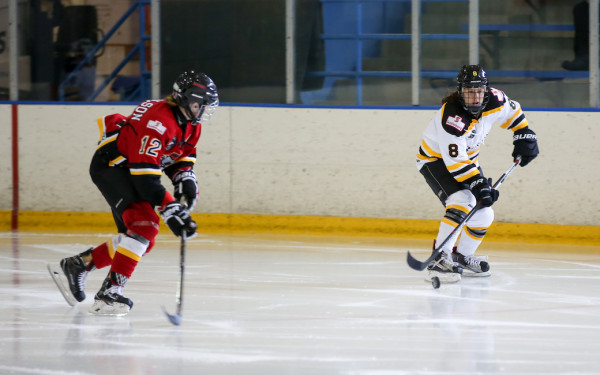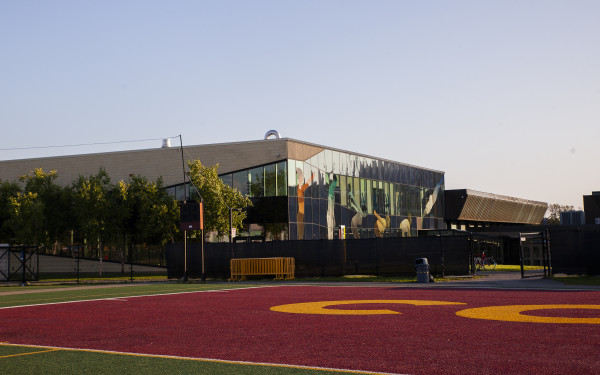Montreal to Host Ultimate Game for Gender Equity
Quebec’s Iris Will Play Boston’s Brute Squad to Promote Women’s Ultimate
October 15 will be an evening of firsts for Iris, a women’s ultimate frisbee team comprised of the best talent from the province of Quebec. Their matchup at Complexe Sportif Claude Robillard will be the team’s first exhibition game but also a first game at home in Montreal.
“We always get asked by our friends ‘when are you playing in our neck of the woods so we can come to see you?’” said Iris captain Audrey St-Arnaud. “So now it’s a golden opportunity for them to do so.”
The team is accustomed to playing in open fields where many games are played at the same time, and fans have to watch from the sidelines. This weekend, Iris fans, who can only keep in touch with the team through social media, will be able to watch them play while sitting comfortably in the stands of a full-fledged stadium.
“My only stadium-playing experiences were when I played in finals of the Canadian championship and it’s clearly louder,” said St-Arnaud. “The crowd is with you on the field, so to relive that with our supporters from Quebec will be awesome.”
In an exhibition game to promote the sport of women’s ultimate frisbee, Iris have called up Brute Squad, a benchmark team in the Triple Crown Tour, the division Iris plays in. According to St-Arnaud, it will be like playing a final game.
The team from Boston is fresh off winning the American national championship last weekend. For Iris, which has only been in existence for two years now, Brute Squad’s longevity as a team can be an inspiration for them.
“It’s a great chance for a young program to be able to play against such a storied team. Brute Squad is a dynasty,” St-Arnaud said. “They performed in the United States for many years now and they were always in the top teams.”
For Brute Squad, taking the road up to Montreal will be a first as well. Used to playing in tournaments across the U.S., it is the first time the team will travel for a standalone exhibition game.
Gender Equity in Ultimate
The exhibition game is also meant to promote gender equity within the sport. In a motion directed towards the U.S. Ultimate federation, a group assembling of 17 men’s, women’s and mixed teams—called the Gender Equity Action Group—asked for equitable visibility for female athletes through a belief statement, which is found online. Brute Squad’s player Leila Tunnell was one of the leaders of the project.
“Leila has been really big in creating the statement that we have sent to [USA Ultimate], our federation,” said Brute Squad captain Claudia Tajima. “We had discussions about it at club nationals last weekend and players from all divisions, men’s, mixed and women’s, all got together and talked about gender equity—it was really great.”
One of the main demands of the group is to include more women’s coverage on USA Ultimate’s streaming partner ESPN3.
“[ESPN3 will] typically show both semi-finals for a tournament that they’re covering in the men’s division, where as they’ll only show one of the women’s semi-finals and one of the mixed semi-finals,” said Brute Squad head coach Ariel Jackson. “Typically they tend to show the men’s semi-finals in a primetime slot.”
For Tajima, the belief statement posted online and sent to USA Ultimate, as well as a petition posted on change.org, has got ultimate players across North America to talk about gender equity.
“People were just not having those discussions because it wasn’t even on folks’ radar on different teams and in different parts of the country,” Tajima said.
The situation for ultimate is also different from many other sports. Since women’s ultimate is not a professional sport, athletes pay membership fees to the federation and in part feel they can have more of a say in decisions.
“In that way we feel like we have a say in what we think should be run and what games should be streamed on ESPN,” said Tajima. “Because we all pay membership dues and it’s a governing body.”
Improvements have been made in more visibility for the women’s game. As part of the national championship last weekend, Brute Squad’s semi-final streamed in the evening, during a prime time slot.
“That was nice to see that USA Ultimate is responding to feedback from their membership,” said head coach Jackson. “We’re hoping to continue pressure to kind of build on the momentum and the drive in the community to have more equitable coverage in terms of what is shown.”
Back in Quebec, St-Arnaud thinks that Iris media visibility of any kind would be great simply for the grassroots —who could only follow the team through Facebook and Twitter—can have “something to aspire to.”
“The little boys in elementary or high school have something to aspire to but the little girls, they have Iris but it’s on social media,” said St-Arnaud. “To have a real game that will be filmed, that will give them something to aspire to because we have had good players in Quebec for years but equity in the media is not the same thing.”
St. Laurent, who is also part of the Quebec Ultimate federation’s board of directors, wants to stress that equity is different from equality.
“We don’t aspire to have the same things the men have, we want a visibility that’s proportional,” she said.
Meanwhile, Iris will look to continue to grow on the American scene and help grow the sport of women’s ultimate in partnership with the semi-professional men’s ultimate team Montreal Royal.
Another subtle sign of equity for the Quebec ultimate federation backed team is volunteering at each other’s games. Women’s teams would volunteer to sell beer at Royal games but the roles will be flipped as Royal players will return the favour and sell beer for the exhibition game.
The Iris and Brute Squad exhibition will take place at Complexe Sportif Claude Robillard Saturday Oct 15. at 7 p.m.
Audrey St-Arnaud was previously called Audrey St-Laurent in this article. The Link regrets this error.

_900_675_90.jpeg)
web_900_601_90.jpg)
_600_832_s.png)

3web_600_375_90_s_c1.jpg)
_600_375_90_s_c1.jpg)

